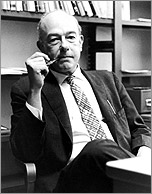 |
Willard van Orman Quine '30, hon. '55
1908-2000
 |
 |
| Willard van Ormon
Quine, the Harvard professor, one of the foremost
philosophers of the 20th
century, died on Christmas Day at age 92 in Boston
after a brief illness.
|
|
Known to his friends as Van, Willard
Quine arrived in Oberlin from his family's home
in Akron, Ohio, in 1926 after selling his cherished stamp
collection to help finance his tuition.
His
older brother Douglas had attended Oberlin, so Mr. Quine was
somewhat familiar with the campus. Among his new college friends
was a group of enthusiastic poker-players, who, while shuffling
cards one day, began to discuss their excitement about the
philosophy of Bertrand Russell. Mr.
Quine, who was captivated, imbued himself in Russell's viewpoints
and decided immediately to major in mathematics with a minor
in the philosophy of math.
In
his autobiography, The Time of My Life, he recalled his four
years at Oberlin as "idyllic." His rooming house, filled with
kindred spirits, was "an ideal setting in which to wax articulate."
Following his sophomore year, he and two friends spent the
summer crossing the continent, jumping onto moving boxcars,
and spending nights on benches or in prisons. This was the
first of the adventures that led to his lifelong insatiable
desire to travel.
By the time Mr. Quine retired, he had set foot in 113
countries in five continents. For his 90th birthday, his family
took him to North Dakota, the only state of the union he had
not visited.
After
graduating summa cum laude from Oberlin, the next stop was
Cambridge, Massachusetts, where, spurred by the economic uncertainties
of the Depression, he completed the requirements for a Harvard
doctorate in just two years under the supervision of leading
philosopher Alfred North Whitehead.
Eligible
for a yearlong, post-doctoral Sheldon Travelling Fellowship,
he married Naomi Clayton '29, and the young couple set off
for Vienna, Prague, and Warsaw, meeting the most distinguished
mathematicians of Europe. Planning carefully, they returned
to Harvard 12 months later with exactly $7 between them.
Mr.
Quine was elected as a junior member of the newly formed,
prestigious Society of Fellows, which allowed him three years
of research. In 1936 he began a teaching career at Harvard
that would last for the next four decades. He retired in 1978.
He
tried to integrate the rigorous study of logic and language
with philosophy to discover what humans can know and how
they can know it. Although not all of his peers agreed with
him, he was nevertheless considered the world's foremost
analytical philosopher, and certainly a luminary of the
academic world. Mr. Quine's position was that philosophy
was contiguous with science, not a separate, privileged
field, that could provide an independent foundation for
other areas of study.
His specialty was in mathematical logic and in the meaning
of language, and he theorized that what exists is what our
best theory says exists. He set out to define the reality
of the world and how humans fit into it. The conclusion
he arrived at was that a person could only understand the
world empirically, or through direct experience of it. He
believed that nothing that humans know lies outside the
realm of language, and so the theory of knowledge depended
upon a theory of language. His paper, "Two Dogmas of Empiricism,"
published in 1951, helped to crumble the barriers between
science and philosophy.
Aside from guest lectures on five continents, Mr. Quine
left Harvard only once, for four years, to serve in World
War II as a Navy officer deciphering communication codes
used by German submarines. His facility in languages included
not only German, but also French, Italian, Spanish, Portuguese,
and a smattering of ten other languages. One of his more
than two dozen books was written in Portuguese. His magnum
opus was Quiddities, written in a style that was eminently
lucid, and, at the same time, lively, elegant, and accessible
to the layman. In his 500-page autobiography, he includes
a long segment about his friendship with Oberlin classmate
and lifelong friend Ed Haskell '28, whom he describes as
"ambitious, opinionated, contentious in the classroom, and
rather shunned as an eccentric." The author mentioned that
he often accepted speaking engagements only for the sake
of their frequent reunions.
Mr.
Quine typed his manuscripts on a 1927 Remington typewriter
he had modified by replacing characters he didn't use with
mathematical fractions. When asked why he didn't need the
question mark on his typewriter, he replied. "Well, you
see, I only deal in certainties."
Among
the hundreds of students whom he taught were the mathematician
and political satirist Tom A. Lehrer and Theodore J. Kaczynski,
later known as the "Unabomber." Mr. Quine is possibly
the only philosopher whose name appears in the Oxford
English Dictionary. The listing "Quinian" is defined as
"Of or pertaining to or characteristic of Willard van
Orman Quine or his theories." Many philosophers use "to
Quine" to repudiate a clear distinction.
Mr.
Quine had a softer side. He enjoyed a very happy second
marriage and was close to each of his children; two by
his first marriage and two by his 1948 marriage to Margerie
Boynton. He loved Dixieland jazz and played the banjo
in jazz groups. He also liked Mexican folk songs, Gilbert
& Sullivan, and playing the mandolin. A self-taught
pianist, he preferred limiting himself to only the black
keys.
Mr.
Quine was awarded an honorary doctor of letters degree
by Oberlin in 1955, and held a dozen and a half other
honorary degrees. He was recipient of the 1993 Rolf Schock
Prize in Stockholm, and the 1996 Kyoto Prize in Tokyo.
Predeceased by his wife and his former wife, he
is survived by three daughters, a son, five grandchildren,
and a great-grandchild.
--by
Mavis Clark
|

